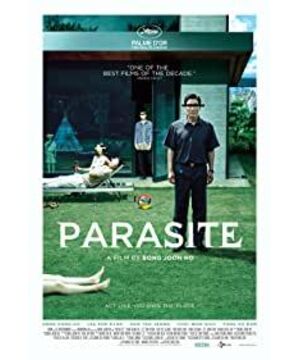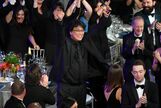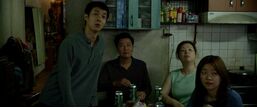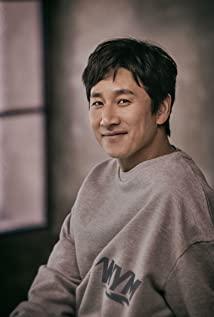This article attempts to break away from the single-layer plot analysis logic as much as possible, and try to respond to the repeatedly mentioned question of "Why are the rich so stupid?": This is an absurd aesthetic created by Feng Junhao, and it is not "realistic." ", while trying to reconstruct "reality." The article is a bit long and there is a lot of nonsense. I hope it can provide some possibilities for "entering" the movie.
A modified version of this article can be found in "Gyro Movie" : Why are the rich people in "Parasite" so stupid?
"Reality": a film that resists the absurd
In different evaluations of "Parasite", whether the plot is credible enough has become the focus of debate. For many viewers, the plot information loaded by Feng Junhao in this exquisite fable is filled with a lot of details that do not conform to the logic of real society, making the characters who laugh and curse eventually slip into distortion, and "why are the rich?" "So stupid" has become the most frequently mentioned question. From the perspective of another part of the audience, the film’s narrative advancement is almost flowing and imposing, and the discordant details do not constitute the destruction of the "real" world created by Feng Junhao and its expression aspirations.
The two views seem to be diametrically opposed, but in fact they are based on a common understanding of the film itself-an acknowledgment of the strong tension or "fragmentation" in the film. But there is still a film between the two. This film determines whether they will capture the new experience brought about by the dislocation after entering this indistinguishable world, or whether they are struggling to distinguish between reality and fiction without knowing what to do.
Bong Junhao may have always been a humorous director. It's just that his "humor" can often be seen in the details of the characters, in the tone of the narrative, and in some small plots, but after all, it has not become a structural force, so that it cannot form a permeable absurdity. feel.
If "Yuzi" is a rough combination in the name of absurdity, a rebellious dream that is too weak to pass by; then "Parasite" is a huge mirage driven by absurdity. If you use the state of the characters in the film as a metaphor, it produces an absurdly huge "vertigo" -always in a semi-conscious state of trying to withdraw or abscond, but it has never succeeded.
Whether you can be infected with this kind of "vertigo" is probably the key to whether you can pierce the "reality" film.
"Abnormal": Absurd calling signal
As mentioned earlier, "vertigo" can be seen as a refinement of the mental model of the whole film. And if "vertigo" is not regarded as a state but as an instantaneous action, then it can be used as a kind of "absurd" calling signal. The call signal of the whole film is more than just "vertigo".
We might as well start with the lady, the most "stupid" character in the whole film.
Before Jiyu officially entered the mansion work, the film was in a relatively stable and slightly humorous low-level narrative tone. In the process of introducing the role of the lady, there was a slight "fluctuation".
The lens sets the gaze on the corner of the kitchen glass window, and there is an imperceptible misalignment between the glass and the green lawn, dappled sunlight and sunken stairs. The audience and Ji Woo looked down at the housekeeper and hostess in the garden outside the window from almost the same perspective. The housekeeper stood on his left side, while the hostess stretched out her arms on the table with bare feet. The two were separated by a thin glass corner line-at this time, the housekeeper who had called the hostess several times suddenly stepped forward and crossed the boundary line. , "P" clapped his hands and immediately retracted; the hostess also suddenly awakened from the afternoon sleep and returned to the graceful state of sitting upright.
The whole process took only a few seconds, but it released an extremely sharp and mechanical signal. It seems that clapping is not an action, but an onomatopoeia that marks a certain grotesque temperament, which becomes a direct statement of the law of interaction in this communicative field.
The next "gaffe" of the other virgin host was when teacher Jessica communicated with her younger son's paintings. Jessica drove away the butler on the side, and the picture space between the two was evacuated, leaving the dark doorway leading to the basement in the background. Jessica directly asked about the past of her youngest son-at this moment, the hostess suddenly screamed, and then a shot was taken from Jessica's left shoulder to the right with the hostess covering her face as the center- a line that was alert like a monitor But what constitutes a space facing the object being viewed. The hostess gradually recovered from the momentary hysteria, tearfully promised Jessica to explore the "black box" in the younger son's heart.
The sound and the lens once again cooperate to become an irregular signal. It pierced a calm communication context, but constructed a new slope-this slope also became a point of sliding to "abnormal".
Another scream appeared when the hostess was discussing with the hostess after he discovered that the driver was "shaking". The film mainly depicts the two through two camera positions: one faces the hostess and casts it from the side of the host; the other is a camera position where the two are almost placed on the same plane, at right angles to the direction of the former. What emerged between the two was still the bottomless doorway . When the male host began to make the final guess, the camera began to swim between the words and expressions of the two. The host questioned "the woman's state", the camera's gaze gradually led to the almost blank look of the hostess, and finally teased the heroine's state as an "abnormal" again.
The relationship between speech and characters, imagination and reality here is once again subtly distorted. The host is obviously speculating about an "abnormal" woman who does not exist at all, but his tone and posture seem to obscure this place. The sign, let the signifier fall onto the wife in front of you from a fictitious space; the wife’s state of astonishment seems to be "attracted" rather than a natural character. On the level of the plot text, the husband is making a kind of "dirty" speculation that the upper class cannot tolerate. On the film narrative level, the husband seems to be the endorsement of the movie narrator as a joke-it once again points out the mistress's nonsense. Normal state, and disturbed the entire context of "reality", tearing open a small entrance.
In the same character, we can also see the "vertigo" of the hostess.
In the film, the hostess had two dizziness in total. For the first time, the hostess witnessed tuberculosis of the old housekeeper "coughing up blood" after being coaxed by a family partner. As soon as he went up the stairs, the driver immediately went forward to open the trash can (interestingly, the hostess here had no intention to look closer), and picked up the blood towel. Under a kind of almost physiological resistance to unclean things, she suddenly fainted-but then the time immediately jumped to when she texted the new driver to discuss privately, this time quickly switched on the one hand to create a gap in the status of the character , On the other hand, it is also a capture of uncertainty : Is it just faint? Or is it a kind of psychological avoidance, or a delicate resistance? What's the point after vertigo?
The second time at the final birthday party. The hostess who witnessed the chaos was able to yell at first - at this time, the "yelling" became the "normal" after the ghosts were released - and when the host was assassinated, the hostess's eyes fell completely dull. , And finally fainted again. This is probably the most hierarchical part of the hostess's state change, but this gradual change seemed so alienated and out of place in the last messy collision of "humans and ghosts". The hostess seems to have once again become a sign of collapse on the stage.
In this series of aberrations or abnormalities, the character's psychology and image are important, but on the other hand, the changing characteristics of the character's state itself also signify a kind of division. In the film’s elaborate narrative system, each character runs meticulously like a galaxy; and these sudden garbled details are the thorny points for the audience to pry into the entire film world: they do not follow any conventional evolutionary process, and It breaks into the field of vision in a "trembling" posture, and returns to normal after a violent swing. It is not only a description of the hostess's character, but also a rigid and mechanical condensed state of mutation.
This kind of almost shocking delivery method shows the unreality of the field itself; if the "movie" is a life body full of wisdom, this series of details is as if it twitches in its sleep, which faintly point to Another subconscious space hidden in the "story"-this may be the space hidden underground, the space inhabiting the "ghosts"; it may be the space under the car where cheap dirty underwear is hidden; it may be that There is space for viruses in the trash can;...
In fact, this kind of subtle sudden change of character is not only seen in the hostess alone.
When Mr. Kevin taught English for the first time, he suddenly stretched out his hand to touch his daughter's pulse, and told her about the psychological skills of test momentum. He seemed to have completely freed himself from the previous decadent low-level youth, and became a professor of success in the upper class in general. Apart from the ability to take repeated examinations, there is no background explanation for all this calm attitude. Feng Junhao directly displayed the results of the acquired skills, which seemed to lack persuasiveness, but instead created this kind of closed vacuum when the character's state was switched.
The housekeeper arrived in the rainy night. At first, she showed a slight horror under the camera. She was very polite and thanked again and again when she entered the room. But when she walked to the doorway, Zhongshu asked her what she was coming for, but she suddenly slowed down her movement speed, turned around and asked Zhongshu, "Would you like to go down together and have a look?"-the camera left her chaotic and damp at this time The black hair mixed with the gloomy doorway in the background, and suddenly, she didn't seem to come from the ground anymore, but became a head emerging from the darkness.
The family sits in the living room of the parasite, drinking and talking and laughing. When Chung-sook mentioned "cockroach", Keeze suddenly turned gloomy and furious-and then looked at Zhong-suk and laughed.
All of these can be regarded as absurd signals conveyed by changes in the character's state.
However, the bottom and the top can also serve as signal transmitters in other worlds. But as the main group depicted in the film, the bottom still has its own unique "absurd" interpretation mode.
"Playing": Absurd Laws of Operation
At the beginning of the film, there is a rather daily but subtle passage: stacking pizza boxes.
Jiyu, who finally found WiFi, contacted the pizza shop, and then found a small video study of foreigners stacking pizza boxes at high speed. The family is working in the disinfectant filled with rolls, the other three coughing ceaselessly, while the father, Keize, runs at high speed casually. After that, the camera immediately cut to the scene where the staff of the pizzeria complained about the quality of the pizza box, and the family's hopes of speeding up making money were quickly dashed.
As a result, this is an eager helpless failure; but from a psychological perspective, this is completely a failure of "imitation"-a failure to imitate a "model worker" on social media, and the deeper level is the high-speed The adaptation of the functioning economic system has failed. On the level of material production, "imitation" must bring excellent results in order to be recognized by the social system-but it is not the same in terms of cultural identity.
The failure of stacking pizza boxes can almost be regarded as the introduction to all actions of the family afterwards: when one kind of imitation fails, replace it with another. This imitation is the inner mental model of the "absurd" after the film: "play". The core setting of the film is not so much the basic class collision model of "parasitic upper class", but rather the parasitic technology that goes deep into the bottom of the body and mind.
The film then began to refine the concept of "playing".
Jiyu's forging academic qualifications is only the most superficial role, at least he does have a certain academic foundation; and for Ji Ting, it does not seem to be too difficult to enter the role of a cold intellectual young woman. By the time Keize and Chung-sook, the difficulty of pure acting has suddenly increased.
Around the 40th minute of the film, a highly rhythmic parallel editing is set: one shows the rehearsal process of Keize and Kiwoo's lines, and the other connects how Keize plays a faithful servant in front of the mistress and "reports" the housekeeper. The passage of time is highly condensed in this passage, and the connection between rehearsal and acting sprints alternately with high classical music like an electric current. The rules of performance guided by Ji Yu were vividly practiced by Ji Ze in real character exchanges. The family completely got rid of the bewilderment of learning to stack pizza boxes, and entered another kind of imitation game like a fish in water. In the end, under the fatal blow of Kiting, the housekeeper who developed physical allergies was also dressed up as a fictitious tuberculosis patient-making an unquestionable "drama" and presented to the hostess.
At this time, the law of "playing" is no longer a simple identity or intellectual proof, but a manipulation of upper-class social psychology : it cannot be too emotional, cannot go beyond the boundaries of etiquette, and cannot be overly cold, let alone mention obscenity or filth. And other taboos. Everything was done quietly in warm, clean and rational private communication. Even the dismissal was the same as the previous driver: you must find a personal excuse.
Of course, behind the above analysis, there is a more fundamental and quite East Asian law operating: the "chain of trust" among the female protagonists. An important factor in the success of "playing" is this unconditional trust in the human society. This kind of kinship trust is the magic weapon for the upper class to reproduce the continuous wealth, power and cultural status. But this group of parasites also know that this kind of "kinship" is not an infinite kind of relationship. They must grasp the intimacy of the upper-class people in modern society-so they must erase the "family" relationship and let the trustworthy The chain is fully displayed as an "objective" element measured by ability. This dominant communicative law is not only the prerequisite for the success of all "playing", it is also the essence of the family's "playing", and more precisely controls the amount of "playing".
When the family parasites successfully drink in the huge living room, this possibility of "playing" is pushed to the pinnacle-they "completely" occupy the upper class space. However, this kind of false dreams do not work equally well in the psychology of different characters, so it swells or even breaks like boiling water.
Back to the "quarrel" mentioned earlier when talking about the status of the characters. After the successful occupation, Chung-suk still has a rather sad self-awareness, and she feels like a "cockroach" when everyone is drinking and having fun. At this time, Keize was obviously unwilling to accept this horrifying fact, and suddenly furiously grabbed Zhongshu's neckline. The camera did not focus on the two at this time, but immediately switched to the appearance of Ji Ze and Ji Ting after grasping-in other words, sweeping to the "audience"-and then jumping back to Zhong Shu. Performers" come. What is intriguing is that this lens did not directly capture the expression of Kizek, but slowly responded after Zhongshu's laughter, thus completing the psychological pavement for Kizek.
This is the first time that Keize has "played" "outside of the plan", and it is also the first "play" that can't distinguish between true and false: when he realizes that he is just a "cockroach", can he really still be able to talk and laugh? When "playing" becomes a normal state of planning, the deeper "playing" can no longer be accurately identified, and it will evolve into a conscious self-concealment. And when the audience or the actors cannot recognize the fictional nature of "playing", the boundary between the actors and the audience is cracked-this stage is about to collapse.
The further development of the "absurd" structure also depends on the development of this mental model: the struggle for the right to "play" has surfaced.
The first 40 minutes of the film may not be an implicit struggle for the right to "play". Only at the moment when a family seemed to have become masters, they put in the former butler and opened the floodgates of explicit contention. When the father and child fell from the underground ladder, this was not any "coincidence" of forced turning, but a clear inevitability of the struggle; when the current housekeeper took out his mobile phone and photographed the embarrassment as evidence, they heard from an eavesdropper. The identity of the "audience" has suddenly fallen: it has become the "actor" to be watched, and it has also become a passive audience who must watch the performance of the former housekeeper who has regained the right to "play".
The meticulous logic of the film is revealed in the next scene.
The former housekeeper began to imitate the North Korean announcer; at the same time, the "gaze" of the mobile phone camera closely monitored the family with their hands up; the family was forced to watch the performance. The previous rehearsal-acting relationship no longer exists, and the momentary reversal of the watching-acting relationship raises the character's psychology so logically and cohesively. The imitation show of the former housekeeper further imposes this gaze of power relations. People who hold the right to "play" (that is, dominate the space of a luxury house) can not only distinguish the enemy from ourselves with irony, but also form a condescending gaze through the false attributes of the role itself.
However, the former housekeeper finally made the same mistake as a family member, that is, mistaking himself for the owner, ignoring the fragility of the right to "play", and even the "playing" nature of "playing" itself.
In the end, the former housekeeper's husband appeared as a "ghost" on the grandest stage in the courtyard. But with blood on his face, he did not appear as a "ghost" actor, but as the legendary "ghost" itself in the heroine population -at this moment, realistic and irrational horror instantly flooded the stage of "fiction" In the world. The story of the youngest son's hero saving the beauty completely collapsed, and the logical chain of "playing" was completely destroyed-the master-servant "playing" relationship between the supporting actor and Kize was also broken. Kize, whose eyes were in a trance, not only pierced the upper class with smell and cleanliness, but also pierced from reality to fiction after the outbreak of the unsustainable war between humans.
Even in the end of the film, the innocent characters who have suffered from "playing" still yearn to return to the stage. He may no longer look forward to playing "upper", but he is still eager to perform another kind of upper "play" that they haven't fully appreciated. The relationship between truth and falsehood has finally been completely erased, and the rules of "playing" and "fiction" that have been penetrated for a while are internalized by the actors and their evolution is completed. They are still unimpeded principles of governance, and a dizzying absurdity that does not know whether it is more virtual or more realistic is still going on.
"Black Box": Absurd mental representation
There is an obvious image echo in the film. As shown in the second "abnormal" point before, the space of the black doorway in the picture is opened, and Mrs. Jessica asked the hostess "Will you open the black box with me?" The development after the story also purely proves this. The isomorphism between the "black box" in speech and psychology and the black space under the doorway. But before analyzing this isomorphism, we need to pay attention to the context in which the concept of "black box" itself was constructed-it is a condensation of the concept of "absurdity" , so it can be used as a kind of absurdity. Multi-dimensional summary of effects .
Jessica was not a high-achieving student in art therapy. Her knowledge only came from temporary learning on the Internet. But this shallow concept of thinking can become a metaphor for the youngest son's psychological world, and easily grab the heart of the mistress. Judging from this passage, "black box" as a literary and theoretical metaphor tries to absorb the real world under the doorway , and Jessica's "playing" is even more ambitious. As the narrative advances, the dark doorway reappears as a hybrid of the known space and the unknown horror. The true existence of its image repeatedly mocks the concept of "black box" until it becomes a completely dark and gushing exit.
As a word, the "black box" tries to complete the task of generalization, envelopment and even healing, but in the end it is only backlashed by the surging reality, becoming a wandering and uncertain signifier. People think that darkness lies in the "black box" that can be expressed in the language, or in the corner of the paper that can be vented by the brush, so that they can face it and solve it; and the real darkness (the darkness here is a medium The sex word) is not bound by a frivolous metaphor. It either wanders like a ghost for a long time, or it triggers the possibility of orderly rewriting by causing a landslide and a fissure.
This is the most apt psychological representation of the "absurdity" contained in the film: all descriptions and explorations of the absurd are so futile, and only the absurd itself runs freely, triggering dizzying horror experiences until the end.
"Miscellaneous": Absurd self-regulation
We might as well return to Feng Junhao's creative trajectory and the question of "reality" raised at the beginning.
To Feng Junhao, "Yuzi" is more like a failed absurd "mixture" . He can't even blend into the humorous tone as lightly as before, and instead is dragged and limp by the bloated paragraph structure and realistic demands. In fact, there have been many character collisions similar to "Parasite" in the film (such as the roles of Tilda Swinton and Paul Dano), but it is too abrupt with all kinds of criticism and irony. There is almost no Be integrated into the narrative system. So that some of the simplest absurdities cannot be smoothly transmitted.
In "Parasite", the bizarre setting itself becomes the skeleton of the absurd, and the richer character status, psychological wrestling, and the multiple fusion of fiction and reality in the space have become the vivid content within the sense of absurdity. As for the plot, it could have been more inextricably developed; as for the characters, they could have been more templated and single; as for the audio-visual skills, it could have been more attached to the narrative game without leaving a trace of emotional space for the characters;... …All of these may make the film more "pleasant", but it is Bong Joon-ho's prudent requirement for "daily" in his absurd system-he must properly "mix" the extreme truth and the extreme falsehood. , Making the film in the artificial setting and fragile story logic, finally successfully swallowed and reconstructed reality.
First of all, the highly "mixed" absurdity connects the constructive concept with the real world, so that both the character and the audience can fall into the rift between reality and fiction. The person in the rupture no longer has the ability to distinguish, leaving a state of "vertigo", a meaningless and absurd origin. This is also the final outcome of Ki Woo.
Secondly, "mixing" is an endeavor that is compatible with abstraction and concreteness. The important role of the film's sense of absurdity is the powerful compatibility between the abstract class collision theater model and the concrete "parasitic" reality. It is embedded with countless "stages", countless "windows" for viewing, and countless "plays" that are difficult to distinguish-and apart from this series of concepts of still water and deep flow, he has not given up on the emotions of the characters. Efforts to be refined.
Third, "Miscellaneous" contains a straightforward and absurd collage. This fits the film's temperament, colliding the overflowing machinery with the rudeness in the most direct way. The straightforward way of expression has instead become a tone controlled by absurd aesthetics, causing inadvertent ambiguity and constructing the same sense of "vertigo".
As if a long series of complex dance steps "on the tip of a knife", many mixed absurdities arbitrarily collide in the field of "daily". "Daily" itself still works, but it has already succumbed to the absurd aesthetics of "mixed" part. The absurd autonomous adjustment in the system. This may be a qualitative improvement of Feng Junhao's director ability in "Parasite".
Finally, back to the question that has been repeatedly mentioned:
Why can the rich in "Parasite" be so stupid?
The answer may be: the film is an absurd "vertigo" that is very different from the "real society". The face in the "vertigo" may not be the "reality", but the power of the absurd itself can penetrate the "reality" and land on the "reality." , Or another higher-dimensional "reality."
View more about Parasite reviews











